Knowledge is Power
Conspiracy has been reinvigorated by Restoration Games and puts you back in the mastermind’s seat, steering a shady secret agency to vie for control of a briefcase of intel. You are not alone, however: several other agencies are also working to get their hands on the case. To come out victorious you will need to bribe the rogue agents in the field to ensure they are in your pocket when it counts. If you are unable to get the briefcase back to your HQ in time, Dr Solomon will reclaim it…unless you’ve paid him well.
Spy vs Spy
Conspiracy is played over the course of several rounds of play with players each vying to retrieve the mysterious briefcase and bring it back to their HQ, which is accomplished by utilizing the various agents around the board. The catch is that the agents are neutral and will only work for the highest bidder. Your success with an agent is tied directly to how well you have paid them off, as any other player can challenge your actions by “bidding” to reveal a portion of what they paid that same agent.
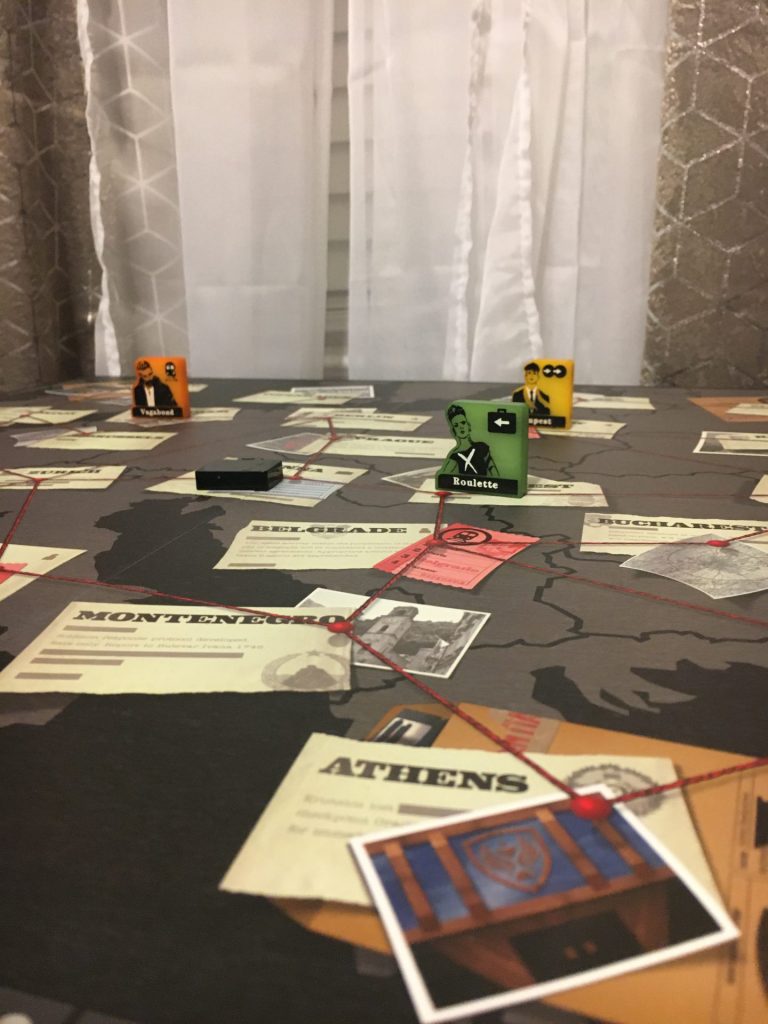
Conspiracy quickly turns into a bidding and bluffing game as you work to deduce how much money each player has put on various spies so you can calculate how best to accomplish your own goals. Let’s back up a bit though and talk about how to make sure your gameplay goes down smooth, like a martini that’s shaken — not stirred. How Does a Secret HQ Work?
Each player starts the game with a player screen, an agent pay off-board, and 30 gold sovereign coins used in “paying off” the 6 freelance agents that are scattered around the board. At the start of a game, players are secretly dealt with a “starting agent” tile where they will place three sovereigns. They then place one sovereign on two other agents. This means that you only have 25 sovereigns remaining to work your bribing magic, while the other players attempt to do the same.
Money Matters
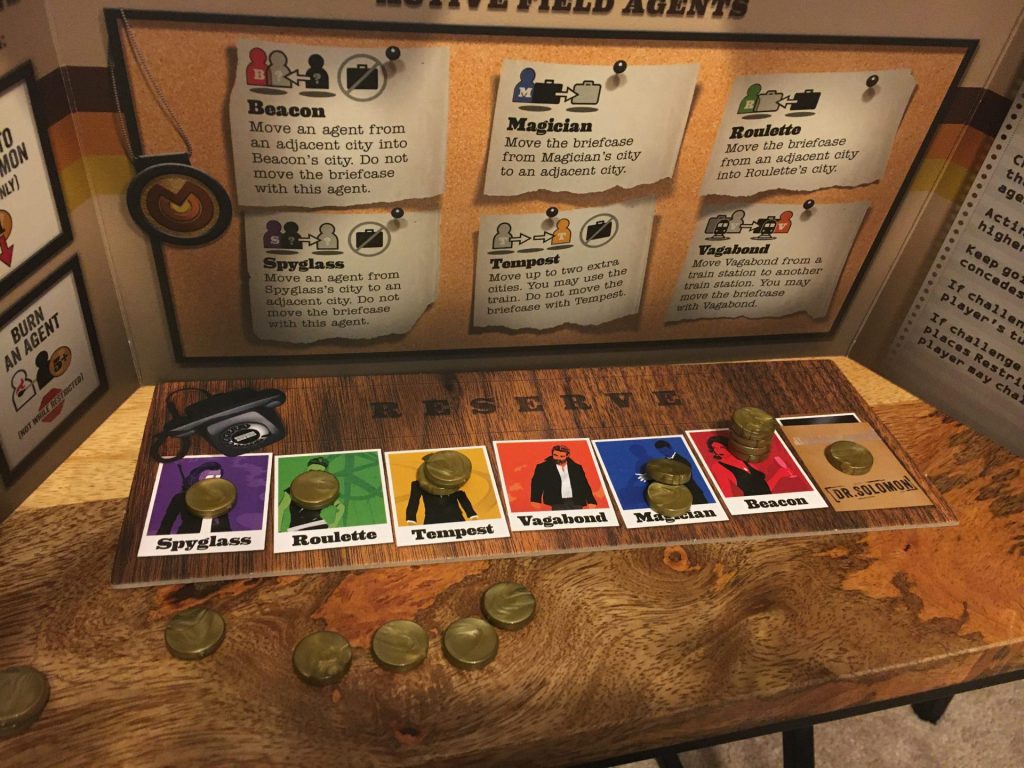
The first major action you can take on your turn is to pay off an agent or Dr Solomon. When taking this action you must declare that you are paying someone off. You cannot share how much money you’re spending, or to whom those sovereigns are going, but you must declare that as your action this turn. When you pay off an agent you may take any number of unused sovereigns and place them on that agent. If you choose instead to pay off Dr. Solomon, you may only ever place one sovereign on him. You may never move sovereigns once they are on an agent so choose carefully.
Get a Move On!
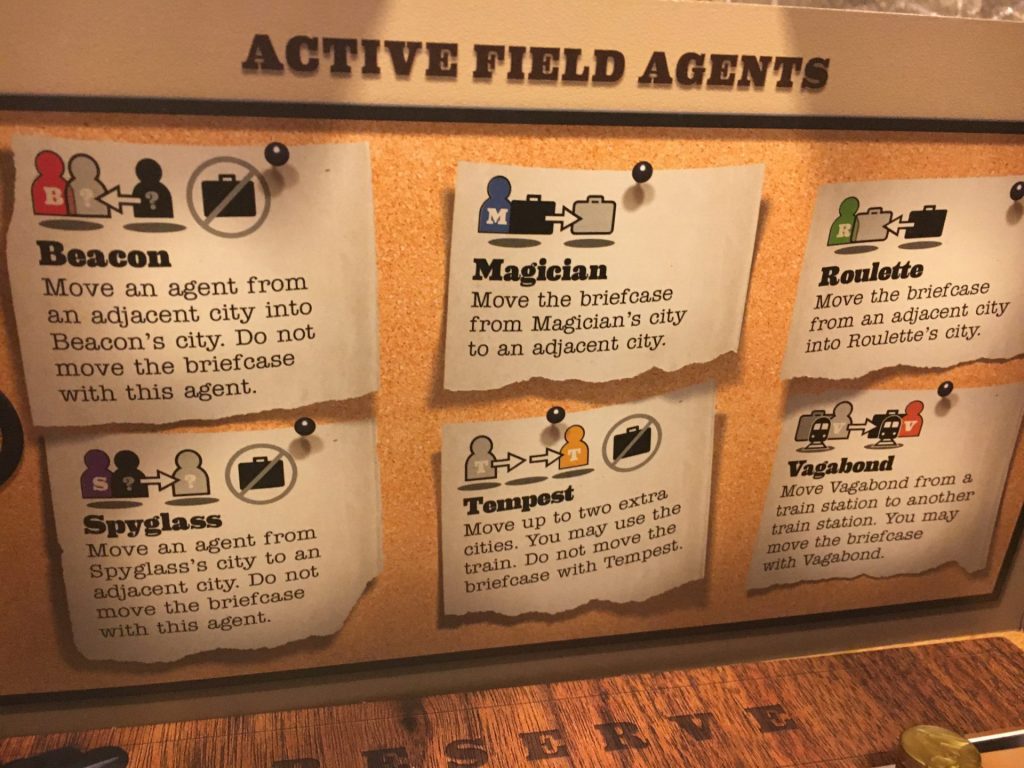
The second action in your repertoire is to move any agent on the game board. To do this, you simply declare any agent, even one you haven’t paid, and state an adjacent area you wish to move them to. At this time, going clockwise, each player has the option to pass or challenge your action. This is a huge part of Conspiracy so we’ll come back to that in a moment. Assuming your action was successful, you may move and then activate the chosen agent’s special ability; an ability that affects other elements on the board or grants increased mobility. Utilizing these six agent abilities well can be a huge tactical boon.
Only YOU Can Prevent Forest Fires
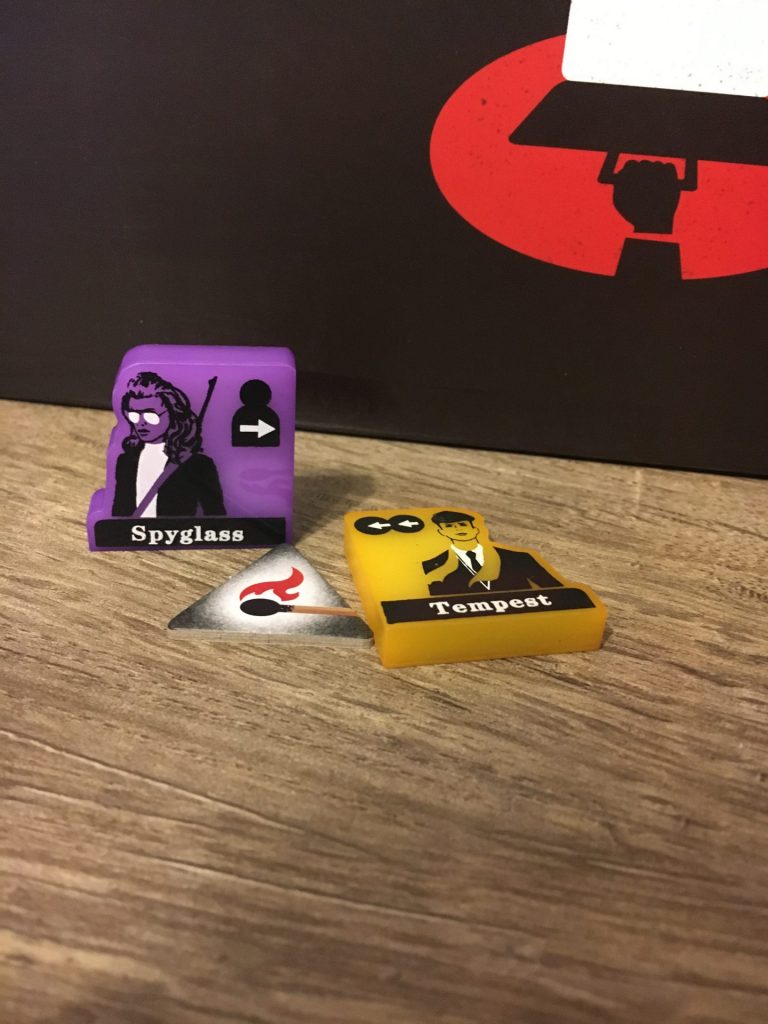
The third and final action available to you on your turn is to burn an agent. This effectively means you are using one agent to assassinate another agent in the same space on the board. For a burn to happen there are several key elements that need to be met. First, two agents need to be in the same space on the board. Second, you must have at least five sovereigns on the agent you’re using as an assassin. If these requirements are met, all other players are able to challenge this action as well to see if they can stop it. If the action succeeds the burned agent is removed from the game and the player removes the five sovereigns from his payoff board, taking them out of the game. This means that while burning other agents can be useful and powerful, it costs you influence that you can no longer exert on the board. Burning should be carefully considered before being acted on.
Here’s a Challenge For You
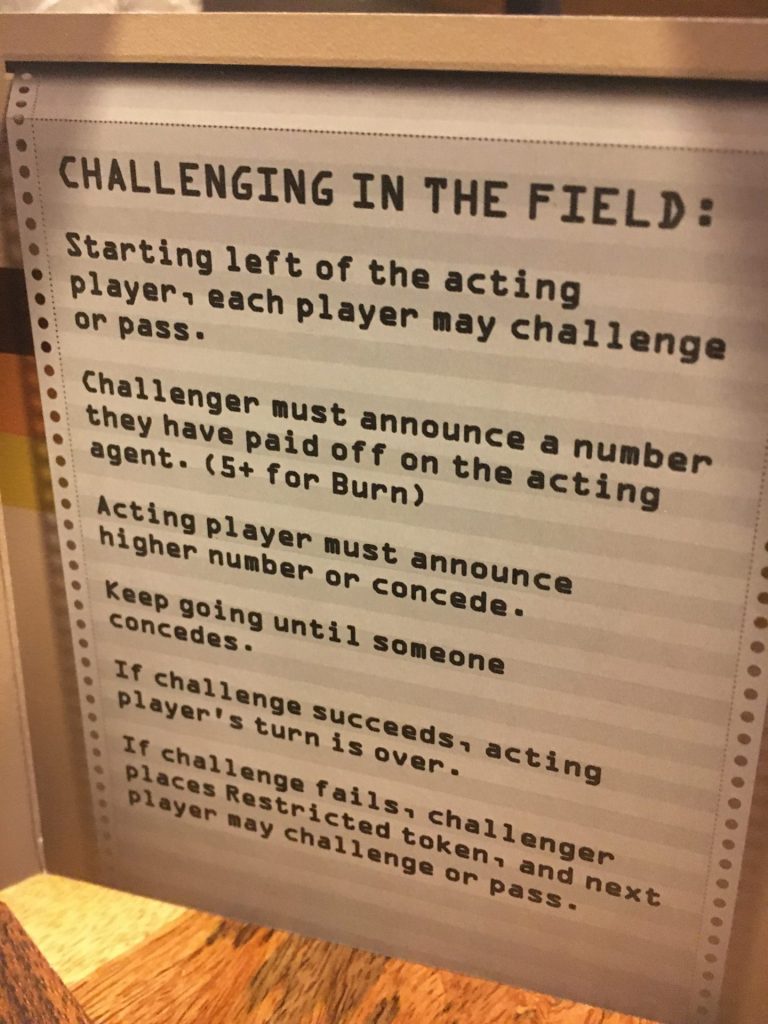
Challenging is the real meat of Conspiracy; it’s the way your thwart your opponents and learn valuable information about the enemy. As mentioned above you can challenge whenever an opponent declares they wish to move or burn an agent. Whenever these actions are declared each opponent, in clockwise order, has a chance to declare a challenge or pass. If there is a challenge the two players will start by stating a number of sovereigns they have on the chosen agent, similar to a bid. This number must be true as you cannot lie in a challenge. Going back and forth, each player must state a number of sovereigns on the agent higher than the other player stated. This continues until a player cannot or will not state a higher number. That player has lost the challenge. If the loser was the active player attempting to take any action, their turn is forfeit and nothing happens. If the loser was the challenger, they place a restricted token on their player board and are not allowed to move or burn an agent on their next turn.
Challenging is key as it will allow you to block key actions for players as well as gain info about how well paid off some agents are. As you work through the game, you’ll realize that challenges are a vital part of the bluffing and social deduction. The key is having enough backing on the same agents to “outbid” your opposition while not blowing your favorite agent and setting yourself up for failure. I found myself often losing challenges on purpose just to throw off the scent of how much I paid off an agent. There are a lot of fun mind games to be had during the challenges, and successful use of the action will determine the victor more often than not in Conspiracy.
And that is it! This nice streamlining of rules and options lets Conspiracy shine in its element, which is stealthy misdirection and social deduction. You will play through a set number of rounds based on player count. If no one has claimed the briefcase by this set round limit, there is a chance that Dr. Solomon will come to try and claim the case himself and give it to the HQ that gave him the most money.
Is This a Gambit Worth Taking?

You don’t need a GoldenEye to see this game is no Oddjob. Conspiracy is, at its heart, a bidding and bluffing game. At the end of the day, you are working to understand and outmaneuver your opponents though bluffs and calculated bids and moves. I thoroughly enjoyed my time with Conspiracy and feel that it fills a nice niche in my collection of games. Restoration Games gave Conspiracy a real facelift which makes it very competitive with other current titles. The balance in the game of playing to short term wins by paying off agents coupled with the need to plan for the long game by building up a reserve with Dr Solomon was a great mix of options to juggle. The rules are easy to learn, with everything laid out clearly on your player screen. This is by far one of the most teachable games around.
The one thing to point out is that by the nature of the game, you are playing on the honor system, which can be a trust hurdle for some to overcome. Since payoffs are gradually made in secret behind player screens, there’s nothing stopping an unscrupulous player from fudging their bribes when challenges happen. If you can overcome that Conspiracy is sure to tickle your game group’s fancy with its quality components and engaging style of play that really shines when you have the right group. If you love puzzles, outside the box thinking, and fun depth to bluffing strategies, then Conspiracy is the golden gun you have been searching for!
Conspiracy: The Solomon Gambit
Pros: Easy to teach, Allows great table interaction, High replayability
Cons: Group engagement dependant, Relies on the honor system
Rating: 6/10, A truly unique take on social deduction that allows for fun moments with your game group.











Add Comment